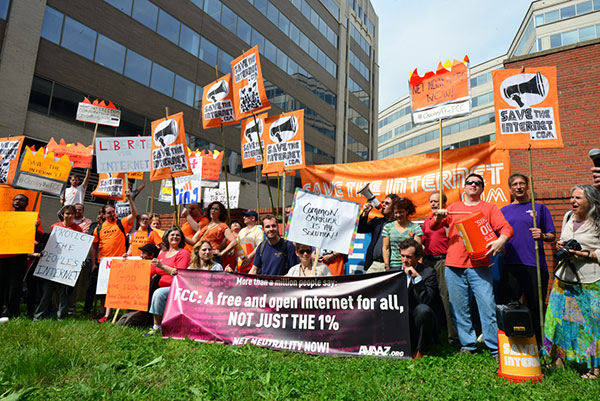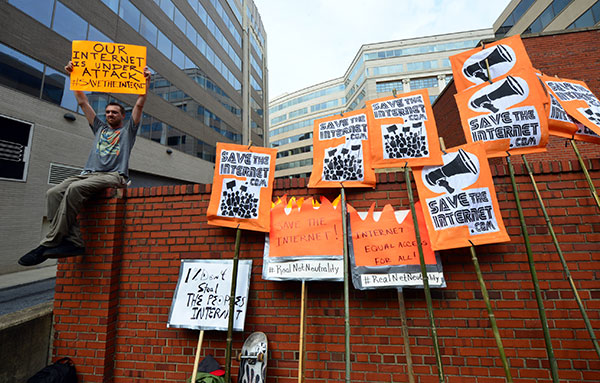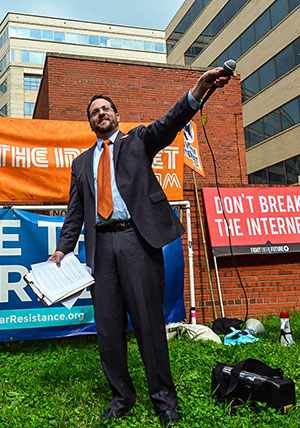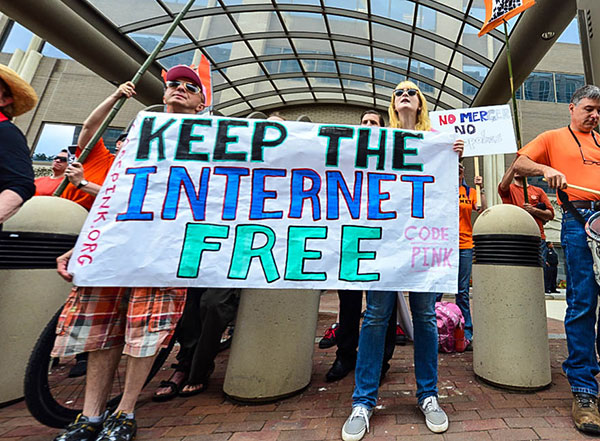People + Policy
= Positive Change for the Public Good
Scroll down to learn more.
On Feb. 26, 2015, the FCC approved strong open Internet rules under Title II of the Communications Act.
This is the biggest victory for the public interest in the agency’s history. And it wouldn’t have happened if not for the millions of people who pushed the FCC to act.
Many of those same people urged the government to block the Comcast-Time Warner Cable merger, which would have enabled Comcast to control the future of the Internet. The FCC and the Justice Department listened — and on April 24, 2015, Comcast abandoned its bid.
The cable and phone companies will continue trying to undermine the open Internet, but our message is clear: Mess with the Internet, and you’ll lose.
A year of unprecedented grassroots organizing pushed FCC Chairman Tom Wheeler to abandon an industry-friendly proposal and instead propose rules that ban blocking, throttling and paid prioritization under Title II of the Communications Act. The full FCC approved these rules in a historic vote on Feb. 26. Title II’s sound legal footing will safeguard this win, but that won’t stop the cable and phone companies from trying to tear it down. In fact, there are now 10 industry-backed lawsuits designed to overturn the open Internet rules — and we filed a motion to intervene in court to ensure these protections survive.
Some of the same companies trying to kill Net Neutrality are also trying to consolidate their power over U.S. consumers. We defeated the disastrous Comcast-Time Warner Cable merger in April 2015 but consolidation continues. We need to demand broadband buildout, not corporate buyouts.





Net Neutrality has made the Internet an unrivaled space for free speech, civic participation, innovation and opportunity. Net Neutrality prohibits online discrimination and gives any individual, organization or company the same chance to share their ideas and find an audience.
Companies like Comcast and Verizon aren’t used to losing in Washington, and they’ll do everything they can to knock down the Title II protections the FCC approved on Feb. 26, 2015. Our message is clear: Mess with the Internet and you’ll lose.
Broadband providers would rather buy out their competition than invest in their networks. But allowing these companies to get even bigger won't help the open Internet — it will only make the gatekeepers more powerful. For the cost of the proposed AT&T-DIRECTV deal and the failed Comcast-Time Warner Cable merger, AT&T and Comcast could collectively deploy super-fast gigabit-fiber broadband service to every single home in America. But the message isn’t getting through: Now Charter wants to buy Time Warner Cable. We need broadband buildout, not corporate buyouts.
Millions of people pushed the FCC to protect real Net Neutrality and block the Comcast merger. We need to do everything we can to ensure the open Internet continues to thrive as a space shared and shaped by its millions of users.
A federal court strikes down the FCC’s 2010 Open Internet Order.
The FCC’s new proposal is leaked — and public interest in Net Neutrality soars.
FCC Chairman Tom Wheeler officially proposes his flawed rules. Hundreds of people converge outside the FCC headquarters in Washington, D.C. and rallies break out in cities across the U.S.
On the day initial public comments on the FCC’s proposal are due, the agency’s servers crash thanks to the heavy traffic. Within a few short hours Free Press and allies mobilize to hand-deliver hundreds of thousands of comments. The agency makes the unprecedented move of extending its deadline by three days.
The SUMMER TO SAVE THE INTERNET: Activists participate in dozens upon dozens of in-district meetings with congressional offices, rally outside fundraisers President Obama attends in the Bay Area and Los Angeles, and file comments in record numbers at the FCC in favor of real Net Neutrality.
The Internet Slowdown. On Sept. 10, hundreds of organizations and online companies — including Netflix, Kickstarter, Etsy and Tumblr — display a spinning icon representing a slow-loading Internet on their websites. This massive day of action drives 2 million emails and nearly 300,000 calls to Congress, and 777,364 people file comments with the FCC.
The period for public reply comments closes. A record-breaking 3.7 million people have filed comments — and most support real Net Neutrality. Big rallies are held in New York City and Philadelphia.
Free Press and allies organize a big speakout in New York City to highlight the voices of the communities the FCC's decision will most impact.
The Wall Street Journal reports on new rules under consideration — rules that would still allow slow lanes online. A huge backlash follows in the press and among public interest groups.
President Obama releases a video statement urging the FCC to reclassify broadband under Title II.
Chairman Wheeler confirms that his new rules use Title II to give Internet users the strongest protections possible.
Victory! The FCC approves Title II-based rules that ban blocking, throttling and paid prioritization online.
Free Press files a legal motion to intervene in the industry-backed court case challenging the FCC's Net Neutrality rules.
Public pressure works: A year of unceasing activism engaging millions of Americans spurred FCC Chairman Tom Wheeler to support Title II reclassification and protect Internet users. Activists across the country also mobilized against the Comcast-Time Warner Cable merger, filing 1 million comments at the FCC. The government listened, and Comcast abandoned its bid.
Check out the comments we filed with the agency:
Free Press members pushed more than 60 members of Congress to speak out for real Net Neutrality. But now some folks in Congress are promoting a bill designed to prevent the agency from enforcing good rules.
We’ve come so far in this fight and we can’t let these troublemakers ruin everything. Tell Congress to stop this bill in its tracks.
Here's how you can help:
To win in Washington you have to organize across the country.
Throughout 2014 and into 2015 we kept up the drumbeat for real Net Neutrality, organizing rallies, protests, people’s hearings and other public events. We also teamed up with our BattlefortheNet.com partners to organize the 24-hour Internet Slowdown. More than 40,000 websites participated in this day of action, which drove more than 2 million emails and nearly 300,000 calls to Congress — and over 700,000 comments to the FCC.
Now that the FCC has passed strong Net Neutrality rules, folks in Congress are trying to undermine this victory. We can’t let them get away with this.
Want to turn up the volume in your community? Here are a few things you can do:
We mobilized an ever-expanding coalition of groups to advocate for strong Net Neutrality protections. Check out the links below to learn more about how Net Neutrality impacts all of our communities.
Knowledge is power. Learn more about what's at stake.
Overviews:
Debunking Industry Lies About Net Neutrality:
Our rights to connect and communicate — via universally accessible, open, affordable and fast communications networks and devices — are essential to our individual, economic and political freedoms.
The Internet is the foremost battleground for free speech in the 21st century, and protecting our Internet freedom is essential to safeguarding our rights to speak and assemble in private.
Together we’re building the movement we need to protect our rights to connect and communicate.
People + Policy
= Positive Change for the Public Good